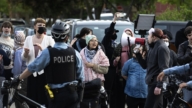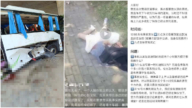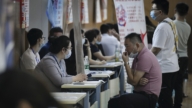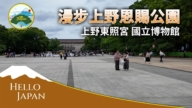【新唐人2011年4月11日讯】当全世界都在关注中国维权艺术家艾未未下落时,美、中两国再就人权问题隔空交火。美国国务院刚公布的年度人权报告中,措辞严厉批评中国人权状况急剧恶化。中共外交部则又以一贯的说词——“干涉别国内政”来反驳。请看报导。
美国国务院在8号,向国会提交了194个国家及地区的《2010年度国别人权报告》。这份长达2百万字,超过7千页的报告中,有145页谈及中国,并且批评中共在人身、言论、宗教、网络等自由上,延续负面发展趋势。
4月9号,中共外交部发言人洪磊就美国的批评做出了回应。说辞仍是与往年一样,他声称:华盛顿不要以“人权教师爷”自居,停止借人权报告等方式干涉别国内政。
美国这份人权报告认为,中共当局在过去1年来,除了加强对言论自由的管制,和更加严控网路和新闻自由外,政治异议人士与维权律师也持续面临非法拘押、不当讯问、软禁,甚至连家人也被殃及。特别是在某些具有政治敏感性的节日与地点,中共的管制行为更为明显。
报告中举艾未未、高智晟为例,说明中国多名失踪异见人士仍下落不明,而且指出,失明的维权律师陈光诚及他的家人,仍然继续遭到软禁。
美国国务院这次对中共的批评,还罕见的出现多个激烈的用词,例如“黑狱”﹔和,将犯人折磨与屈打成招﹔以及,禁锢和骚扰记者、作家、异见者、上访者,和一切使用和平手法寻求公义的人民﹔还有,司法制度欠缺合理程序﹔法院和法官听命于政治﹔闭门审讯﹔以行政手段禁锢人民﹔限制人民集会、宗教以及旅游的自由。人权报告在中国这一章的引言最末一句话是:“贪污仍然无所不在。”
同时,联合国人权小组“强迫或非自愿失踪”工作组,也公开关注中国最近一波逮捕维权人士及律师的行动。这个小组警告,根据国际法,所谓的强制失踪属于犯罪。“强制失踪或非自愿失踪”工作小组说,他们正式抗议中共“持续压迫异议人士” 这种“令人发指的做法”,并对这些受迫害人士提供补偿。
这个小组提到,过去的例子包括第11世班禅喇嘛根敦确吉尼玛。他于1995年以6岁稚龄失踪,至今下落不明。而人权律师高智晟过去2年时间,大部分都不知去向等。
国际社会近期也继续就人权问题向中共施压。其中,澳大利亚总理吉拉德,向到访的中共全国政协主席贾庆林表示,澳洲会继续支持任何国家的公民,表达政见的权利,希望北京当局能确保公民的权利得到保障。
新唐人记者王子琦、李若琳综合报导。
U.S. Criticizes China’s Human Rights Record
As the world inquires for Chinese artist Ai Weiwei’s,
China’s human rights record is again under fire.
Recently, the U.S. State Department released
its annual human rights report
where Beijing was harshly criticized.
Chinese Foreign Ministry responded:
this is interfering with China’s internal affairs.
April 8, the U.S. State Department released
“2010 Country Reports on Human Rights Practices".
Of the 7000-page report, 145 pages
were about China. It said that the negative trend in
key areas of China’s human rights record continues.
On April 9, China Foreign Ministry spokesman,
Lei Hong, responded with the same statement
as that of last year. He said: “The U.S. should stop
being a human rights teacher.
Stop interfering in other countries’ internal affairs
with human rights reports."
The report says in the past year the Chinese regime
increased efforts to limit freedom of speech
and to control the press and Internet. It resorted
to extralegal measures including detention,
and house arrest to silence political dissidents
and public interest lawyers, even their families
were also oppressed. Especially with regard to
politically sensitive dates or places,
the Chinese Communist Party’s (CCP)
repression can be seen plainly.
The report cited Ai Weiwei and Gao Zhisheng’s
disappearances and said that legal activist
Chen Guangcheng, along with his family,
remained under house arrest.
For the first time, the report used some harsh words
like, “black jail,” torturing prisoners for confessions,
detaining and harassing journalists, dissidents,
petitioners and justice-seeking citizens, biased
criminal justice system, convictions handed down
to courts and judges, closed door trial,
strict restriction on political freedom,
religious freedom and travel freedom.
The introduction of China chapter ended
with “corruption remained endemic.”
Meanwhile, UN’s Working Group on Enforced
or Involuntary Disappearances has been
paying attention to China’s recent arrests
of dissidents and lawyers. The Group warned
that the enforced disappearance was a crime.
it officially protested CCP’s continuing oppression
of dissidents, and it provided support to victims.
The Group said that past examples include
the 11th Panchen Lama, Gendun Choekyi Nyima.
He has been missing since 1995, when he was 6.
Human rights lawyer Gao Zhisheng too
has been missing for most of the last two years.
China’s human rights issue is still a hot topic.
Australian Prime Minister Julia Gillard told
Jia Qinglin, Chair of China Political Consultation
Committee, in his recent visit to Australia,
that Australia hopes Beijing can protect
its’ citizens’ basic human rights.
NTD reporters Wang Ziqi and Li Ruolin






























